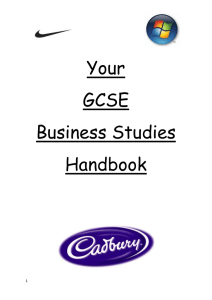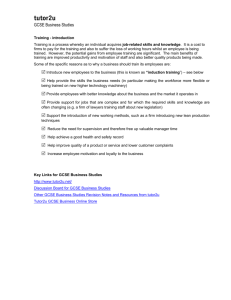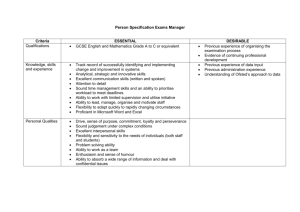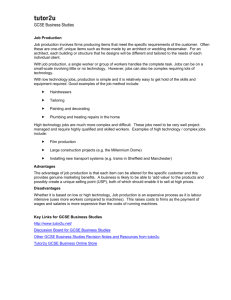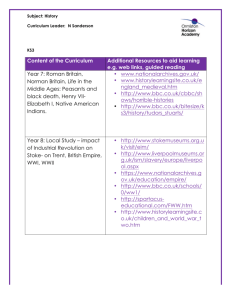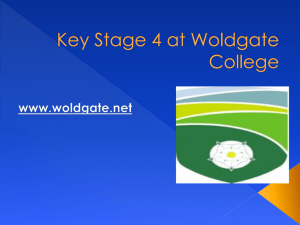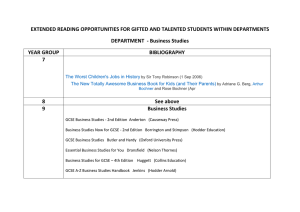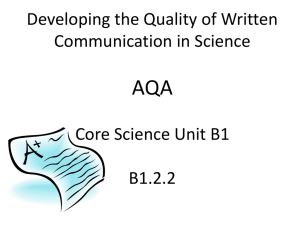Business Studies GCSE Sept 2012
advertisement
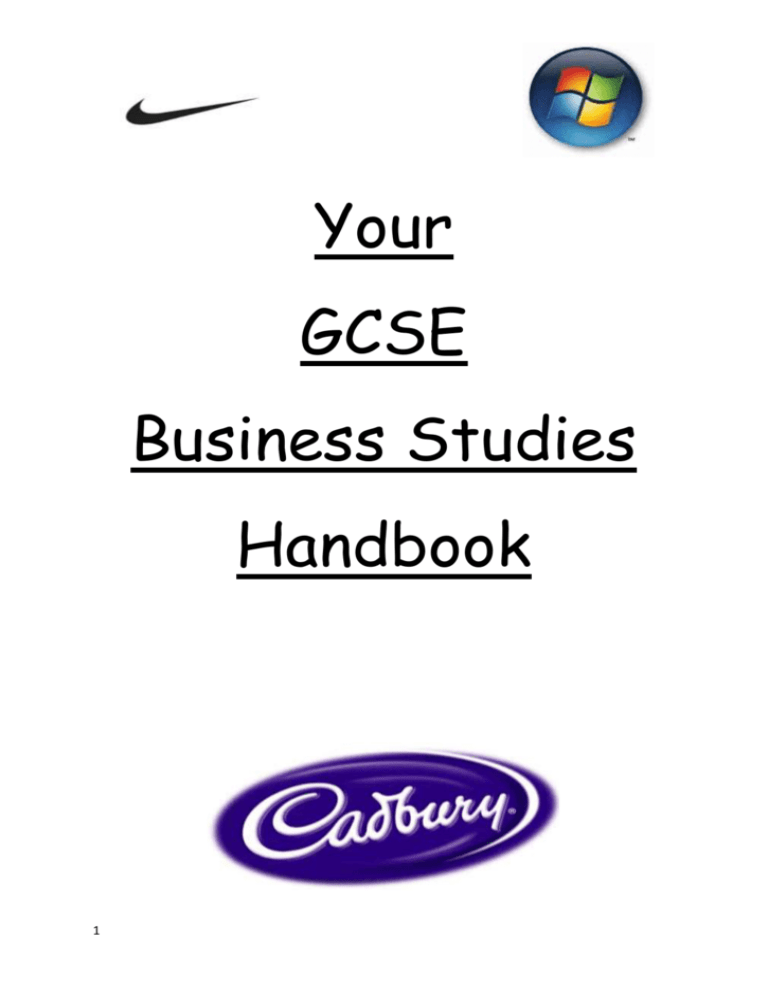
Your GCSE Business Studies Handbook 1 Welcome to the subject of Business Studies! We think that you have made a very good choice in choosing this subject and we hope that you enjoy studying it as much as we enjoy teaching it! This handbook aims to give you and your parents an overview of what to expect in GCSE Business Studies. It includes information on what will be taught and how the course will be assessed. What will you learn? There are three units that make up the course. In the first two units you will be introduced to the world of small businesses and will look at what makes someone a successful business person. You will find out how to develop an idea and spot an opportunity and turn that into a successful business. You will understand how to make a business effective and manage money well. You will also see how the world around us affects small businesses and all the people involved. In Unit 3, you will learn more about how small businesses develop and you will discover how businesses promote themselves and keep their customers happy. You will learn how businesses manage their finances and the people who work for them. How will you be assessed? The course consists of two written examinations and a controlled assessment task. The controlled assessment will be completed in the second half of the autumn term in Year 11, and this counts for 25% of the total marks for the qualification. For the controlled assessment you will be given a list of 5 questions based upon the work you have covered in Year 10, with one question linked to each topic area. Most of the questions will be investigating what a local business is doing, and you should choose which question interests you the most. You will then have up to 6 hours where you conduct research, both in and out of the classroom into your title. This might involve using the internet to find information, conducting a short survey, interviewing the owner or customers, looking at sales literature, statistics and books. You will need to keep a log to record your research activities and build up a research file containing the information you have found. . You will then have three hours in school, under exam conditions, where you can use the information you gathered through your research to assist you in writing up your answer to the question you have chosen. The rest of the assessment is through 2 written exams, which are taken at the very end of the course. Unit 1 is a multiple choice and objective test with questions, and it is 30 minutes long. This is largely testing your knowledge of business studies concepts. Unit 3 which is another written examination paper, lasts for 90minutes. The questions will be a mixture of multiple- choice, data response, short-answer, extended-writing and scenario-based questions. These will test your ability to apply your knowledge in order to explain the reasons why businesses do certain things, and your ability to consider the advantages and disadvantages of actions businesses actions. This paper tests the higher order skills of analysis and evaluation. 2 Detail of each unit and what you will be studying Year 10: Unit 1 - Introduction to Small Business 1.1 1.2 1.3 1.4 3 Spotting a business opportunity Understanding customer needs Market mapping Competition Added value Franchising Showing enterprise What is enterprise? Thinking creatively What questions do entrepreneurs ask? Invention and innovation – generating new business ideas Taking a calculated risk Other important enterprise skills Putting a business idea into practice Objectives when starting up The qualities shown by entrepreneurs Estimating revenues, costs and profits Forecasting cash flows Obtaining finance Making the start-up effective Customer focus The marketing mix The importance of limited liability Start up legal and tax issues Effective on-time delivery and customer satisfaction Recruiting, training and motivating staff 1.5 Understanding the economic context Market demand and supply Impact of changes in interest rates Impact of changes in exchange rates How do business cycles affect small businesses What effects do business decisions have on stakeholders Year 11: Unit 3 – Building a Business 3.1 3.2 3.3 3.4 4 Marketing What is marketing? Market research Product trial and repeat purchase Product life cycle Branding and differentiation Building a successful marketing mix Meeting customer needs Design and research development Managing stock and quality Cost-effective operations and competitiveness Effective customer service Meeting consumer protection laws Effective financial management How to improve cash flow How to improve profit Break-even charts and analysis Financing growth Effective people management Organisational structure Motivation theory Communication Remuneration 3.5 The wider world affecting business Ethics in business Environmental issues Economic issues affecting international trade How will you be assessed and what do your results look like in grades? For each unit you take you will receive a mark and a grade. These marks are then added together to give you your total mark for the subject and this is then converted into your overall GCSE grade. For example, if you scored 39 on Unit 1, 43 on Unit 2 and 75 on Unit 3, you would have a total subject mark of 157. This would give you a grade B overall for Business Studies. The minimum marks required for each grade for each unit are as follows: Units 1 and 2 Unit grade Max = 50 marks A* 45 A 40 B 35 C 30 D 25 E 20 F 15 G 10 A* 90 A 80 B 70 C 60 D 50 E 40 F 30 G 20 D 100 E 80 F 60 G 40 Unit 3 Unit grade Max = 100 marks What your GCSE grade looks like overall: GCSE grade Max = 200 marks 5 A* 180 A 160 B 140 C 120 GCSE Business Studies Grade Descriptions To achieve a Grade A You must be able to recall accurately, select and communicate your detailed knowledge and thorough understanding of business concepts, theories, issues and current practices. You must be able to use business terminology accurately and appropriately. You must be able to plan and carry out effectively a range of investigations and tasks using a wide range of skills competently, making effective use of time and resources. You must show that you can use your knowledge and understanding effectively to select and organise information from a wide range of sources and that you can investigate business organisations in a range of contexts. You can use and evaluate quantitative and qualitative evidence effectively with a high degree of accuracy to analyse problems and issues, and make informed and reasoned judgements to present conclusions accurately and appropriately. To achieve a Grade C You can recall, select and communicate sound knowledge and understanding of business concepts, theories, issues and current business practices, and use business terminology appropriately. You show that you can plan and carry out different investigations using a range of skills appropriately. You can apply your knowledge and understanding to select and organise information from a variety of sources in order to investigate business organisations in different contexts. You can use and evaluate evidence to analyse problems and issues with some accuracy and make reasoned judgements and present conclusions that are supported by evidence. To achieve a Grade E You demonstrate knowledge and understanding of some basic aspects of business concepts, theories, issues and practices. You can use some simple business terminology. You can carry out a straightforward investigation and tasks using a limited range of skills. You can apply your knowledge and understanding to select and organise simple information from a limited range of sources to investigate business organisations. You can identify simple evidence in order to analyse problems and issues and make judgements. You can present simple conclusions that are sometimes supported by evidence. 6 Finally! What more can you do? We hope that your interest in the subject will develop and extend outside of the classroom and doing homework. There are a number of things that you can do and these will help deepen your knowledge and understanding of the subject. These include watching the news for current business stories and reading newspapers such as The Daily Telegraph, The Times and The Guardian (available in the school library!). You could also watch programmes such as The Apprentice and Dragons’ Den. The following websites are also excellent sources of information: BBC Bitesize www.bbc.co.uk/schools/gcsebitsize/business Bized www.bized.co.uk Business Studies Online www.businessstudiesonline.co.uk The Times 100 www.thetimes100.co.uk Bank of England www.bankofengland.co.uk British Franchise Association www.thebfa.org Tutor2U www.tutor2u.net BBC business news www.bbc.co.uk/business Federation of small businesses www.fsb.org.uk Dragons Den www.bbc.co.uk/dragonden Business Link www.businesslink.gov.uk Franchises and starting up www.uk250.co.uk The Business Channel www.thebusinesschannel.com Business in the Community www.bitc.org.uk Your teacher is also around to help you, so always ask when you do not understand or need further information! 7 8
